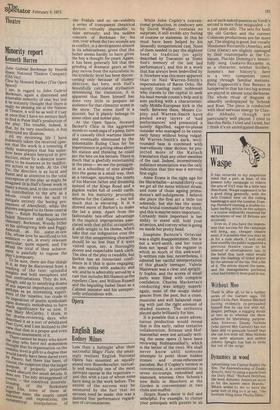Opera
English Rose
Rodney Milnes
Less than a fortnight after their successful Magic Flute, the amazingly resilient English National Opera has mounted an equally sound new Rosenkavaher, textually and musically one of the most intricate operas in the repertoire — and this with a cast of whom none have sung in the work before. The extent of the success may be measured by the fact ' that no excuses need be made: this was a damned fine performance regardless of circumstances. While John Copley's conventional production, in unshowy sets by David Walker, contains no surprises, it still avoids any feeling of routine or staleness. In this he must have been helped by his blessedly inexperienced cast. None of them needed to pay the slightest heed to tradition (so aptly described by Toscanini as 'Some fool's memory of the last bad performance'), and this in a work that has always been bedevilled by it: Nowhere was this more apparent than in Neil Warren-Smith's impersonation of Baron Ochs, the naively trusting rustic nobleman who travels to the capital to seek his haut-monde cousin's help and is sent packing with a characteristically Middle-European kick in the teeth. Between them, Messrs Copley and Warren-Smith have peeled away layers of tad performances' and presented a quietly dignified, eager-to-please outsider who managed to be extremely funny without being vulgar. Mr Warren-Smith's dark, wellrounded bass is combined with marvellously clear diction; he projected more of the Kalisch translation than any other member of the cast. Indeed, intermittently indistinct enunciation was the only indication that this was a nervous first night.
Anne Evans is the right age for the Marschallin— around thirty—so we get all the notes without strain, and none of those ageing primadonna's self-indulgences. I believe she plays the first act a little too solemnly, but she has the somewhat brutal command for the third, and this is maybe more important.Certainly more important is her ability to stand still, hold your attention, and convey what is going on inside her pretty head.
Josephine Barstow's Octavian was a slight disappointment. She is not a word-smith, and her voice does not 'speak' in the register in which so much of this awkwardly-written role lies; nevertheless, I admired her tactful interpretation of this ghastly teenager. Valerie Masterson was a clear and sprightly Sophie, and the scores of small parts were filled with complete confidence. Charles Mackerras's conducting was simply superb: again, none of the soupy indulgences from the past, but a clean, muscular and well balanced reading with just the right amount of shaded nuance. The orchestra played quite brilliantly for him.
It is possible that a more adventurous production would reveal that in this early, rather tentative collaboration, Strauss and Hofmannsthal were not actually writ ing the same opera (I have been reviewing Hofmannsthal's, which is the better of the two). We shall never know until someone attempts to point those hidden ironies and cross-referenced parodies. But if Copley's version is conventional, it is conventional in seven no-trumps, redoubled and slammed, whereas Otto Schenk 's new Ballo in Maschera at the Garden is conventional in two clubs and muffed.
Jiirgen Rose's decor is dull and unhelpful. For example, to clutter your principals with gauzes in an act of such naked passion as Verdi's second is more than misguided — it is just plain silly. The sets for both the old Garden and the current Coliseum productions are far more apt. The singing is good, but vocally Mesdames Ricciarelli (Amelia), and Grist (Oscar) are slightly upstaged by their counterparts at the Coliseum. Placido Domingo's beautifully sung Gustavo/Riccardo is, as a character, neither Scribe's, Somma's nor history's: here is a very competent tenor going through familiar motions. Piero Cappuccilli's fine Renato is hampered in that his two big scenes are played in almost total darkness. The whole ritual of disguise is absurdly underplayed by Schenk and Rose. The piece is conducted with ideal nervous energy by Clau dio Abbado, though not particularly well played. I tried to like this Ballo, I tried and I tried, but I think it's an unmitigated disaster.


































 Previous page
Previous page